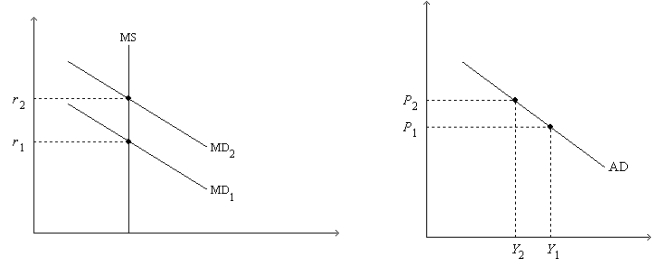Figure 34-2. On the left-hand graph, MS represents the supply of money and MD represents the demand for money; on the right-hand graph, AD represents aggregate demand. The usual quantities are measured along the axes of both graphs.

-Refer to Figure 34-2. A decrease in Y from Y1 to Y2 is explained as follows:
A) The Federal Reserve increases the money supply, causing the money-demand curve to shift from MD1 to MD2; this shift of MD causes r to increase from r1 to r2; and this increase in r causes Y to decrease from Y1 to Y2.
B) An increase in P from P1 to P2 causes the money-demand curve to shift from MD1 to MD2; this shift of MD causes r to increase from r1 to r2; and this increase in r causes Y to decrease from Y1 to Y2.
C) A decrease in P from P2 to P1 causes the money-demand curve to shift from MD1 to MD2; this shift of MD causes r to increase from r1 to r2; and this increase in r causes Y to decrease from Y1 to Y2.
D) An increase in the price level causes the money-demand curve to shift from MD2 to MD1; this shift of MD causes r to decrease from r2 to r1; and this decrease in r causes Y to decrease from Y1 to Y2.
Correct Answer:
Verified
Q47: Figure 34-2.On the left-hand graph,MS represents the
Q55: When households decide to hold more money,
A)interest
Q63: According to liquidity preference theory,if the quantity
Q64: Figure 34-2.On the left-hand graph,MS represents the
Q76: Figure 34-2. On the left-hand graph, MS
Q77: Figure 34-2. On the left-hand graph, MS
Q79: If,at some interest rate,the quantity of money
Unlock this Answer For Free Now!
View this answer and more for free by performing one of the following actions

Scan the QR code to install the App and get 2 free unlocks

Unlock quizzes for free by uploading documents